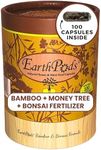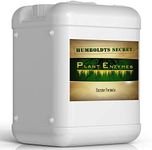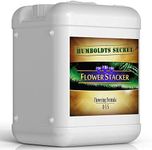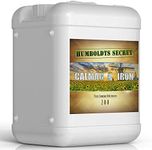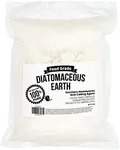Buying Guide for the Best Bamboo Fertilizers
Choosing the right bamboo fertilizer is essential for ensuring the healthy growth and vibrant appearance of your bamboo plants. Bamboo, like any other plant, requires specific nutrients to thrive. When selecting a fertilizer, it's important to understand the key specifications and how they impact the health of your bamboo. This guide will help you navigate through the important aspects of bamboo fertilizers and how to choose the best one for your needs.NPK RatioThe NPK ratio represents the proportions of Nitrogen (N), Phosphorus (P), and Potassium (K) in the fertilizer. Nitrogen promotes leafy growth, phosphorus supports root development, and potassium enhances overall plant health. For bamboo, a balanced NPK ratio like 10-10-10 or a slightly higher nitrogen content like 16-6-8 is often recommended. If your bamboo is primarily grown for its foliage, a higher nitrogen ratio is beneficial. For overall health and root strength, a balanced ratio is ideal.
Type of FertilizerFertilizers come in various forms, including granular, liquid, and slow-release. Granular fertilizers are easy to apply and provide nutrients over a period of time. Liquid fertilizers are quickly absorbed and are ideal for a quick nutrient boost. Slow-release fertilizers gradually release nutrients over several months, reducing the need for frequent applications. Choose granular or slow-release fertilizers for consistent feeding, and liquid fertilizers for immediate nutrient needs or to address specific deficiencies.
Organic vs. SyntheticOrganic fertilizers are made from natural materials and are environmentally friendly, improving soil health over time. Synthetic fertilizers are chemically formulated and provide immediate nutrient availability. Organic options, such as compost or manure, are great for long-term soil health and sustainability. Synthetic fertilizers are useful for quick results and precise nutrient control. If you prefer an eco-friendly approach and long-term soil benefits, go for organic fertilizers. For immediate and controlled results, synthetic fertilizers are a good choice.
MicronutrientsMicronutrients like iron, manganese, zinc, and copper are essential for the overall health of bamboo, even though they are needed in smaller quantities compared to NPK. These nutrients support various physiological functions and prevent deficiencies that can lead to poor growth and yellowing leaves. Look for fertilizers that include a range of micronutrients to ensure your bamboo receives a well-rounded nutrient supply. If your bamboo shows signs of specific deficiencies, choose a fertilizer that addresses those particular needs.
Application FrequencyThe frequency of fertilizer application depends on the type of fertilizer and the growth stage of your bamboo. Slow-release fertilizers may only need to be applied once or twice a year, while liquid fertilizers might require monthly applications. Granular fertilizers typically need to be applied every few months. Consider your schedule and the specific needs of your bamboo when choosing a fertilizer. If you prefer less frequent maintenance, opt for slow-release fertilizers. For more hands-on care, liquid or granular options may be suitable.
